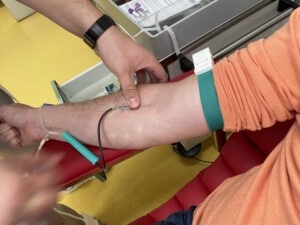We’ve all seen it so many times we tend to ignore it: a child buying a large soda after school, advertisements for sugary drinks at kids’ athletic events, and young people downing a soda with seemingly every fast-food or restaurant meal.
But skyrocketing obesity rates demonstrate that sugary drinks are not meant to be consumed every day.

In the United States, more than 40% of kids aged 2 to 19 years are overweight or obese, up from one in three kids in 2000. More than 70% of kids older than 5 years old consume too much sugar every day, leading over many years to obesity, emotional stress, and infertility.
Kids don’t outgrow this habit. More than 40% of American adults are obese. Among Black and Hispanic Americans, one in two adults is obese.
We should begin with what kids drink. Soda, sports drinks, sweetened teas, coffee, and juices deliver extraordinary amounts of added sugar. Although the American Heart Association recommends less than 25 g of sugar daily, some smoothies contain as much as 46 grams of added sugar, contributing significantly to kids’ daily sugar intake. For kids 6 years and older, the consumption of more sugary drinks is associated with higher body weight and increased risk of cardiovascular disease mortality across their lifetime.
Our culture has normalized this level of sugar consumption and it’s even taking a toll on government spending. Sadly, we spend federal dollars on these products. The SNAP program, which gives a monthly dollar amount to families on a preloaded card to buy food, demonstrates it too well: Families that participate in the assistance program consumed more sugary drinks daily compared to those only enrolled in WIC, an electronic system that gives recipients a card for food benefit issuance and redemption at certain stores. Approximately $4 billion in SNAP funding is spent on sugary drinks annually. Removing sugary drinks as a SNAP-eligible purchase may prevent significant suffering from Type 2 diabetes over time.
We also need to educate consumers on the risks of consuming sugary beverages by requiring front-of-package labeling warning of the associated health risks.
Although the constitutionality of warning labels on fully legal products has been challenged, New York City recently passed the Sweet Truth Act, which requires chain restaurants to put high-sugar warnings on prepackaged menu items that contain over 50 grams of added sugar. It’s a start.
We have so many other problematic policies to unravel. There are advertising tax deductions that promote the marketing of sugary drinks to children, so there’s no surprise that sugary drinks are marketed to kids.
The Stop Subsidizing Childhood Obesity Act would deny tax deductions for advertising directed at children for food of poor nutritional quality. Implementation of the USDA local school wellness policy’s final rule, part of the Healthy, Hunger-Free Kids Act of 2010, would prohibit advertising and purchasing incentives of sugary drinks in and around schools, on buses or at kids’ sporting events.
We should also use intelligent economic tools to turn to the tide. Increasing the price of sugar-sweetened beverages through excise taxes also has been shown to effectively reduce sugary drink consumption.
A study showed that for every 10% increase in a city’s average price of soda, there was a 3% relative decrease in the prevalence of overweight and obesity in teenage girls. A significant amount of obesity-related morbidity and mortality is attributable to sugar-sweetened beverages, and it causes increased medical spending. Surely those facts should influence legislators, not merely the fact that revenues from a sugary beverage tax are estimated at $656 million a year.
Changing what we eat is difficult. It will take a concerted effort over many years to reduce the consumption of sugary drinks.
Removing the desire to consume sugary drinks will begin with policies that educate consumers and end federal support.
Beals is a resident at Cohen Children’s Medical Center and a graduate of the Zucker School of Medicine at Hofstra/Northwell. Pilapil is a physician specializing in internal medicine and pediatrics at Northwell Health.





































